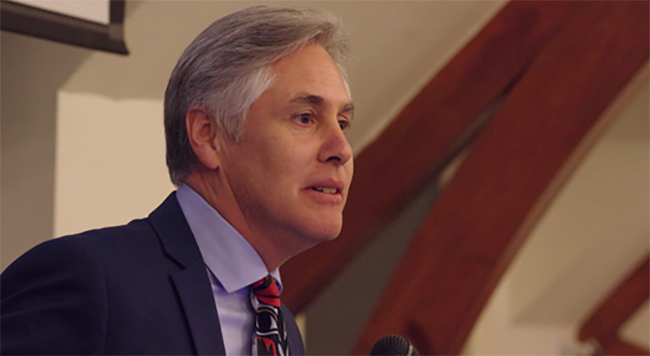Borrows speaks at Lakehead University’s Dibinawe Onashiwewin (Inherent Law) Indigenous Lecture Series

By Rick Garrick
THUNDER BAY – University of Victoria law professor John Borrows, a Chippewas of Nawash citizen, delivered the inaugural presentation for Lakehead University’s Dibinawe Onashiwewin (Inherent Law) Indigenous Lecture Series on March 1.
“There is a role for language in the revitalization of Indigenous law,” Borrows says during his Revitalizing Indigenous Law through Language presentation at the Bora Laskin Faculty of Law’s John N. Paterson Auditorium. “Indigenous laws are strengthened by using Indigenous languages, despite the impact of colonialism on Indigenous languages. In other words, these languages are important forces for nation rebuilding and Indigenous governance.”
Borrows says he has been learning Anishinabemowin for about 10 years.
“I’m not fluent, but even when I know a little bit about the language I learn a lot about what our laws require,” Borrows says. “I’m inspired by those who are fluent and continue to have patience with us who are learning. And I am grateful for those that keep on with that great task of teaching the languages.”
Borrows says sound is treated as being vital to understanding the world within Anishinabe law.
“In fact, it might be said that Anishinabe people live in a society of sound,” Borrows says. “Our origin stories start with sound, that is seeds of energy crashing together to produce the first waves of life. The collapse and expansion of these sounds reverberate through space over countless ages, and in the process these sounds generate the conditions for life.”
Borrows says Anishinabe sounds can foreshadow the work of law. He adds that the drumbeat is an extension of sounds that arose from life’s first boom.
“This pattern also happens to measure the cadence of law, and drums therefore in their sounding out can also foreshadow the organizational work of law,” Borrows says. “Now some people say our Midewiwin Society, our Grand Medicine Society, is also a society of sound. Rattles, songs, water drums and words mingle and harmonize to produce waves of life that are aimed at good living — Mino-Bimaadiziwin.”
Borrows says the point he is trying to make is that “Anishinabe law flows through sound, it flows through language, it flows through rattles and drums and hearts beating with one another.”
Borrows says a visit to Fort William’s sugar bush the last time he was in Thunder Bay enabled him to learn about the laws of Anishinabe citizenship through sounds he experienced on the land. He also spoke about how he and groups of university students he invites to his home community learn about law through language in relationship to sound while being on the land.
“Another aspect of Anishinabe language revitalization, which has significant implications for law, is the idea that there is animacy that runs through our languages as Algonkian people,” Borrows says. “When we look out onto the world, we can’t help but describe things that English would consider to be dead or without life to be fully agented, fully capable of exercising choice and having intent and responsibility in the way they are in the world.”
Borrows says the language of animacy is built on the insight that the world is alive and has an agency of its own, and that humans can discern communications from these forces if they are immersed in this linguistic and legal tradition for sufficient periods of time.
“The implications for the revitalization of law in this context therefore are always present as long as the language is being spoken,” Borrows says.
Borrows also delivered the opening remarks at the Lakehead University Bora Laskin Faculty of Law Aboriginal Justice Systems Conference on March 2.


